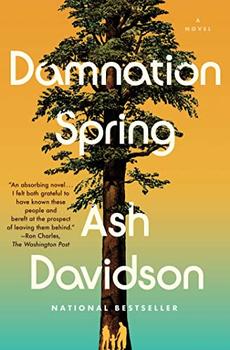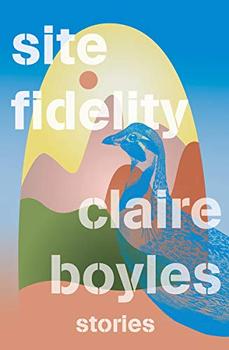Summary | Excerpt | Reading Guide | Reviews | Beyond the book | Read-Alikes | Genres & Themes | Author Bio

Set in the late 1970s in a secluded town near California's rugged, fog-draped Del Norte Coast, Damnation Spring tells the story of the Gundersons, a family of three whose livelihood — like that of just about everyone in their tightknit community — depends on the prized timber of ancient redwoods, massive, millennia-old trees that can reach heights of more than 350 feet.
A giant of a man at six-foot-eight, stoic but gentle-hearted Rich Gunderson is a fourth-generation logger, a high-climber who scales towering redwoods with just rope and spiked boots — the same dangerous work that claimed the life of his father and grandfather years earlier. Grief-stricken by a string of miscarriages, Rich's younger wife Colleen works informally as a midwife even as she mourns her own inability to have another child after the birth of her one son, lively kindergarten-aged Chub.
For 38 years, Rich has worked for Sanderson Timber Company, the commercial logging outfit that practically owns the town. But now in his 50s, Rich knows that his days of felling trees are numbered — not only because his aging body can't keep up with the arduous labor but also because the timber harvesting business is dying out. Decades of aggressive clear-cutting have left only a fraction of the old-growth forests still intact, and an expanding National Park Service is turning tens of thousands of acres into protected land.
So when Rich stumbles into the opportunity to buy a ridge of pristine old-growth forest that he can harvest to secure his family's future, he jumps at the chance — depleting all their savings and taking out a crippling loan without telling his wife. Meanwhile, Colleen has a secret of her own. Haunted by her repeated miscarriages and by the troubling spate of birth defects and stillbirths plaguing the community, Colleen begins to suspect that the herbicides sprayed by the timber company are to blame and covertly teams up with Daniel Bywater, a former classmate back in town for research, to test water samples for contamination.
One of the few to have escaped the backwoods for college and a brighter future, Daniel is viewed with hostility by the logging community and branded as a meddling outsider bent on stirring up trouble — despite his homegrown roots and the fact that he is a member of the Yurok tribe, the Indigenous people who lived on and cared for the land long before white settlers moved in and began razing the forests. Complicating matters is the fact that Colleen and Daniel have a past together. And when she joins Daniel in digging deeper into the truth about the toxic sprays, Colleen and Rich find themselves on opposing sides in a conflict that pits neighbor against neighbor — and threatens a rift in their marriage.
Told through the rotating perspectives of Rich, Colleen, and Chub, Damnation Spring is a nuanced, deeply empathetic portrayal of a family and community trapped in a tragic dilemma: their livelihood depends on the timber company, but the job that puts food on their table is destroying the very land their future depends on — and their own health and wellbeing in the process.
In addition to the Gundersons, a wide cast of other characters weave in and out of the story, including Colleen's sister and her clutch of kids, the Sanderson Company's unscrupulous honcho Merle, and eccentric Lark, a former logger and father figure to Rich who lives off of tourists visiting the drive-through redwood tree on his property. And in addition to the environmental themes that drive the plot, the book touches on a full slate of other issues, including the fraught relationship between the Yurok people native to the area and the white members of the logging community, the plight of workers exploited by corporate greed, grief and resilience in the face of great loss, and the basic human instinct to protect one's children at all costs.
A graduate of the Iowa Writers Workshop, Davidson was born in the region where Damnation Spring takes place, and her familiarity with the area shows in the way she brings her setting to life with vivid details that evoke a strong sense of place. Pitch-perfect dialogue makes her characters feel real, and intricate depictions of the logging industry deftly convey the realities of living and working in timber country.
Davidson is particularly adept at writing about the natural environment. Lush descriptions capture the magic of the landscape — dizzyingly tall redwoods disappearing into the fog, dewy ferns and rhododendrons, cool-flowing streams crisscrossing the terrain. Juxtaposing such lyrical passages with grim portrayals of the environmental havoc wreaked by logging — eroded hillsides denuded of trees, mud-choked streams, plundered groves littered with branches and debris — Davidson provides a stark reminder of what's at stake.
"When you poison the land, you're poisoning your own body," as Daniel Bywater's sage old uncle says. "Is it worth it? Just to get the cut? But no, you won't rest until you've killed every deer, every salmon, every tree, until you've poisoned all our springs. What will you eat then? Money? What will you build your house from? What will you drink when you're thirsting?"
More than 40 years after the time frame of the book, as we grapple with a climate crisis caused by our collective failure to rein in our most ecologically destructive habits, it is an all too timely message.
![]() This review was originally published in The BookBrowse Review in September 2021, and has been updated for the
May 2022 edition.
Click here to go to this issue.
This review was originally published in The BookBrowse Review in September 2021, and has been updated for the
May 2022 edition.
Click here to go to this issue.

If you liked Damnation Spring, try these:

by Daniel Mason
Published 2024
A sweeping novel about a single house in the woods of New England, told through the lives of those who inhabit it across the centuries—a daring, moving tale of memory and fate from the Pulitzer Prize finalist and author of The Piano Tuner and The Winter Soldier.

by Claire Boyles
Published 2021
Set in the western sagebrush steppe, Site Fidelity is a vivid, intimate, and deeply human exploration of life on the shifting terrain of our changing planet.
Your guide toexceptional books
BookBrowse seeks out and recommends the best in contemporary fiction and nonfiction—books that not only engage and entertain but also deepen our understanding of ourselves and the world around us.